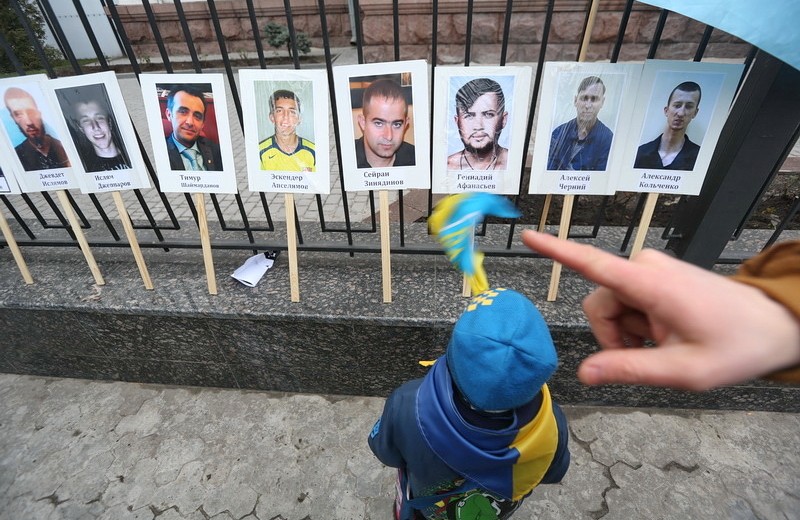The Russian government refused to release Ukrainian director Oleg Sentsov and activist Oleksandr Kolchenko, sentenced to prison by a Russian court, Ukraine’s Justice Ministry said on Oct. 21.
According to Ukraine’s Justice Ministry, Russian authorities said that the political prisoners Sentsov and Kolchenko can’t be released and extradited to Ukraine because they are Russian citizens – a fact that was denied by Sentsov’s relatives.
Sentsov, 40, and Kolchenko, 26, were detained by Russian law enforcement in Crimea on May 11, 2014 and accused of plotting a terrorist attack. A Russian court in Rostov-on-Don found Sentsov and Kolchenko guilty in August 2015 and sentenced them to 20 years and 10 years, respectively. They deny the charges.
The Ukrainian government and international human rights watchdogs such as Amnesty International consider the case fabricated and demand the release of Sentsov and Kolchenko.
Russian citizenship?
Ukrainian Deputy Justice Minister Sergiy Petukhov said on Oct. 21 that Russian Justice Ministry declined the request for extradition of Sentsov and Kolchenko, claiming that both have received Russian citizenship after Crimea annexation in the spring of 2014, and now have both Russian and Ukrainian citizenship.
Russian Justice Ministry also said that according to Russian laws, the person who has two citizenships, one of which is Russian, is considered a Russian citizen, and can’t be extradited to another country.

A boy waves a Ukrainian flag in front of portraits of people killed or imprisoned in Russia on Human Rights Day in front of the Russian Embassy in Kyiv on Dec. 10, 2015. Oleksandr Kolchenko’s portrait is the first one from the right. (Volodymyr Petrov)
Previously, the court papers listed Sentsov and Kolchenko as Ukrainian citizens, according to Russian human rights activist Zoya Svetova, who has been following the case closely.
Sentsov’s cousin Natalia Kaplan denied her brother’s Russian citizenship and condemned Russian authorities for the refusal to extradite the prisoner in an interview with the news website 15 Minutes on Oct. 21.
“He only has one passport, and it’s Ukrainian,” Kaplan was quoted as saying.
As Russian authorities refuse to extradite a prisoner they say is a Russian citizen, earlier in 2016 Ukraine has extradited Ukrainian citizens to Russia on its request. Ukrainian journalist Olena Glishchinskaya and her husband Vitaly Didenko, imprisoned on separatism charges in Odesa, were exchanged for Ukrainians Yuriy Soloshenko and Hennady Afanasiev, who were imprisoned in Russia.
Threat of sanctions
Ukrainian Justice Minister Pavlo Petrenko said on Oct. 21 that Ukraine will continue demand the extradition through international organizations and courts.
Petrenko also said that he would initiate the expansion of personal sanctions against top Russian officials who obstruct returning Sentsov and Kolchenko to Ukraine.
Russian news agency Interfax reported on Oct. 22 citing its sources in Russian government that Ukraine negotiates with Russia the possible exchange of Sentsov and Kolchenko for Russian citizens detained in Ukraine.
13 prisoners
In July, Ukraine’s Foreign Ministry said that Russia was holding 13 Ukrainian citizens as political prisoners, Sentsov and Kolchenko being the most high-profile among them.
The most famous Ukrainian prisoner held in Russia, military pilot Nadiya Savchenko, was released in May. In June, Russian authorities released and extradited Soloshenko and Afanasiev.
On the same day as Russia refused to extradite Sentsov and Kolchenko, Russian activist Svetova claimed that another Ukrainian imprisoned in Russia, Stanyslav Klykh, “is in a very severe psychological condition” after being tortured in a pre-trial prison in Russia.
Earlier in 2016 a Russian court has sentenced Klykh and another Ukrainian Mykola Karpiuk to 20 and 22 years in prison for fighting against Russian forces in the First Chechen war in the 1990s. Both deny the charges. Klykh said that he had never been to Chechnya.
